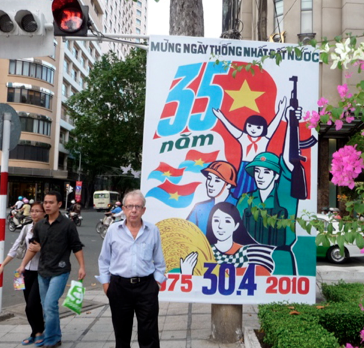People
In nostalgic return to Vietnam, Jim Pringle remembers fallen comrades
Friday 30 April 2010
 Thirty-five years after the end of the war in Indochina, some of the journalists who covered the fighting have returned for a bittersweet reunion. More than 20 journalists came together for a nostalgic reunion tinged with sadness for the scores of colleagues lost on the battlefields of Vietnam and Cambodia.
Thirty-five years after the end of the war in Indochina, some of the journalists who covered the fighting have returned for a bittersweet reunion. More than 20 journalists came together for a nostalgic reunion tinged with sadness for the scores of colleagues lost on the battlefields of Vietnam and Cambodia.
For some it was their first return to the region since 30 April 1975 when communist North Vietnamese tanks smashed through the Presidential Palace gates in Saigon. The US-backed government of South Vietnam announced its unconditional surrender, ending the war. In neighbouring Cambodia, the war had ended with the fall of Phnom Penh to the Khmer Rouge on 17 April 1975.
Among the self-proclaimed old hacks re-living old times in old haunts was Jim Pringle, one of the first Reuters correspondents to be assigned to cover the war and one of the few journalists for whom the adjective legendary is apt.
Pringle completed his first tour of duty in Vietnam six weeks after the Tet Offensive in January and February 1968, and left for home leave before taking up his new post as Reuters correspondent in Cuba.
"Two weeks after that, my mother woke me one morning to say that four correspondents, two of them from Reuters, had been killed in Saigon. The two from Reuters were Bruce Pigott, 23, whom many Old Hacks here would know, and Ron Laramy, 31, from the UK who had joined us just two months before. The others who died were John Cantwell from Time and Michael Birch from the Australian Associated Press."
Pringle, who later worked for Newsweek and The Times, recommends a visit to the journalists' church St Bride's next to the old Reuters headquarters at 85 Fleet Street, London. "There is a plaque there for Bruce and Ron, and I try to visit it every year. Yesterday, I went up to Han Thuyen, and stood for some minutes - not to be intrusive - and thought of the four correspondents as they must have been as they pulled away from the Reuter office for the last time. To paraphrase the world war one poet, and not to be maudlin, they did not grow old as we who are left grow old, and at the going down of the sun we will remember them, as we remember all our late colleagues."
Pringle remembers the lighter moments of working in Phnom Penh. Journalists sometimes capped their evenings with a visit to Madame Chantal's opium den, where diplomats and some of the local elite also congregated. "We would take off our clothes and put on a sarong, and we would just lie there and chat. After you had a pipe, the tension would abate and the B-52 strikes that you'd hear in the distance would grow fainter and fainter."
Pringle also recalled that about two months ago he applied for a press visa at the Vietnamese embassy in Phnom Penh. This would entitle him to a pass to see the annual 30 April Liberation Day parade in Ho Chi Minh City and attend the press conference that usually follows it.
"The embassy asked me for credentials, cuttings, etc. They said they had sent the documents to the Department of External Relations in Ho Chi Minh City. Ten days before we left they said that they now had to re-submit them to the Press Centre in Hanoi. No surprise there. But the Hanoi Centre indicated we would be met wherever we arrived (even on the bus from Cambodia?), and that it would cost us.
"I let the matter slip and got an ordinary visa at the consulate in Sihanoukville, as the embassy in Phnom Penh wouldn't issue them as they now knew I was a journalist. Yesterday, at the City Hall - where I had attended the press conference five years ago - I met Mr Tuan, director of culture and information at External Relations. He already had the documents, so could he issue a press pass for the parade as the Mongolians and other press representatives were getting, thanks?
"Mr Tuan told me that he doubted that I was who I said I was, and he doubted that I was the Reuter bureau chief at the time of the Tet Offensive. He also doubted that I had known Pham Xuan An, who used to work for Reuters, and then was with our near neighbour, Time, and who came regularly to consult with our own senior Vietnamese reporter, the late Pham Ngoc Dinh. Tuan also doubted I had seen An with a guide from Hanoi after his real background was revealed [he was one of the Viet Cong’s best undercover agents and after the communist victory was honoured as a Hero of the Revolution]. And he doubted that I had interviewed Marshall Vo Nguyen Giap in Hanoi.
"He then said one or two other not so pleasant things."
Former correspondent Peter Sharrock, now a professor of archaeology at London University's School of Oriental and African Studies and an expert on Khmer antiquities, was prevented from attending the reunion by the airport shutdown in Europe caused by the Icelandic volcano eruption.
PHOTO by Milly Pringle: Jim Pringle in Ho Chi Minh City, formerly Saigon, with a 35th anniversary Liberation Day poster. ■
- « Previous
- Next »
- 491 of 541